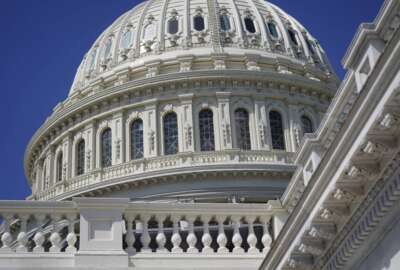Veterans and their families should have an easier time accessing military service records, now that the National Archives and Records Administration has eliminated a pandemic-era backlog of requests.
The agency announced Wednesday it finally cleared its backlog of veteran records requests.
The backlog at NARA’s National Personnel Records Center (NPRC) in St. Louis, Missouri peaked at more than 600,000 unprocessed requests at the height of the COVID-19 pandemic.
Pandemic-era building occupancy limits led to the backlog, and constrained the agency’s ability to send employees back into the facility and access the mostly paper records.
Archivist of the United States Colleen Shogan told Federal News Network in an interview Friday that NPRC employees who put in extra hours on holidays and weekends were essential to driving down the backlog over the last two years.
“Their willingness to go the extra mile to eliminate this backlog was really what made the difference,” Shogan said. “There was not a federal holiday that went by where we weren’t also allowing people to come in, to work away and chip away at the backlog. Over time, this was optional, and people chose to want to do it, so that they could be part of this effort to eliminate the backlog.”
Congress gave NARA $60 million to help clear the records backlog in the 2023 National Defense Authorization Act.
The Technology Modernization Fund in May 2022 also invested $9.1 million in NARA to support short and long-term records modernization efforts.
“The Technology Modernization Fund was critical, because that helped to improve the application on everybody’s computers that processed the requests coming in from veterans, and enabled more requests to be handled in any given hour of any given day. It increased the bandwidth and the power of that application, which allowed the backlog to be eliminated much quicker than it would have been otherwise,” Shogan said.
By tapping into these funds, NARA generally stayed on track with its timeline of eliminating the backlog by December 2023.
“We had projections for every week, and if we were off the projection for any reason, I would inquire why, and if there were ways in which I could help, then I did. So, it was a lot of vigilance from our leadership,” Shogan said. “But once again, it was the people who actually do the work — the people who fill those requests, our archivists and our archivist technicians — who actually came in and did the extra work and got it done.”
NARA expects that it will now be able to fill most requests from veterans — especially simple requests for their military service records — in a week or less. The agency is also on pace to respond to almost all requests, including complex requests, within 20 days.
Meanwhile, it continues to receive more than 4,000 new requests each day.
Complex cases include requests for military service records that show deployment locations. Some veterans need that information to sign up for VA health care and benefits under the PACT Act —which expands VA health care and benefits eligibility for veterans exposed to toxic substances.
“It wouldn’t necessarily just appear on your summary service record. You have to look further into the record to see where the military service member actually spent time, throughout his or her career. So that would be a potentially more complex request,” Shogan said.
Veterans and their families in some cases may also need to request more extensive records from NARA to apply for certain military service medals and honors.
“Some of the medal qualifications have changed over time, and a service member might have not qualified for a medal 10, 15, 20 years ago. But now those qualifications have changed, and the person is applying for consideration for the medal,” Shogan said.
NARA has also been working with the Department of Veterans Affairs to digitize veterans’ records, with the VA taking advantage of funding from the American Rescue Plan to accelerate that work.
“It’s much quicker and faster for the VA to help us with the digitization of records, which keeps our staff and employees free to be able to do the response to the requests that come in. So that’s been the division of labor,” Shogan said.
Those record digitization efforts remain ongoing — and will continue for decades to come, if NARA were to digital all of the military records it stores.
The agency is currently digitizing its most recent veteran records first, and working backwards from there.
“What we really have to get through is the past 40 or 50 years of records, where people are still accessing the benefits. And once that is done, the bulk of our requests will be in a digital format, and we’ll be able to respond much, much quicker and much more efficiently,” Shogan said. “This has really made the National Archives better prepared and will improve service to veterans for decades to come.”
Digitization will also help NARA preserve records lost to physical damage. A major fire at NCPC in July 1973 destroyed up to 18 million military personnel files.
“My own father’s military records from the Army, post-World War II, were unfortunately lost in the fire,” Shogan said. “So I understand firsthand what happens to records if they fall victim to some of these unfortunate circumstances that take place.”
To further expedite requests, Shogan said NARA is testing out artificial intelligence tools to handle some of its most common and straightforward requests — such as a veteran requesting their DD Form 214, or certificate of release or discharge from active duty.
“The way that we’re doing that is enabling an artificial intelligence to be able to look at a veteran’s digitized record or born-digital record and be able to locate the one piece of information that the veteran is seeking and be able to pull that form out of the larger record, and then deliver it to the veteran via email,” Shogan said.
She added that NARA’s AI pilot remains ongoing, but is expected to shorten wait times for records.
“It’s been very, very successful. And eventually, we will roll that out in larger scale. And once we do that, that will enable our very talented staff to focus on some of the requests that are a little bit harder to fulfill — and then the wait time for those requests will do down as well.”
Copyright
© 2024 Federal News Network. All rights reserved. This website is not intended for users located within the European Economic Area.





